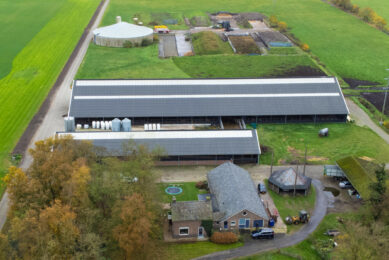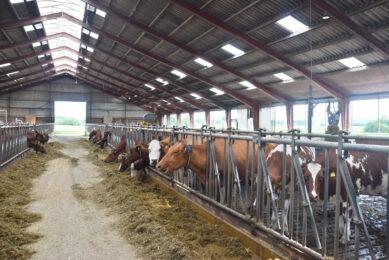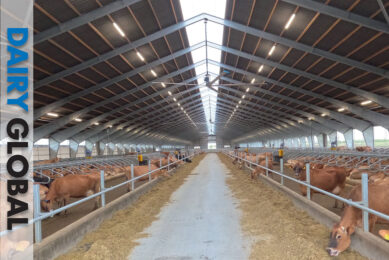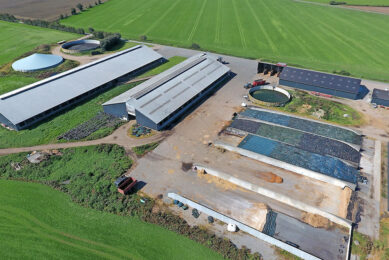Arla: “Sometimes in front, sometimes not”

Dairy company Arla has no intention of disconnecting the price for organic milk from the price for conventional milk. Despite the fact that this strategy has meant that the dairy firm has lost some members. Dairy Global speaks to the coop’s vice president, global member services, Henrik Damholt Jørgensen, about Arla’s strategy.
Arla has to do everything in its power to hold on to its organic dairy farmers. An important matter for discussion is the way the price for organic dairy is calculated. Up until now, the dairy cooperative maintains a link between the prices of regular and organic milk. However, it appeared Arla was overtaken by events in the past year. It was painful for the cooperative to see a group of dissatisfied dairy farmers transfer to a German buyer. Despite the fact that the milk price was one of the most important reasons for this transfer, there are no plans to relinquish the mentioned price link completely, according to Henrik Damholt Jørgensen. The board is however looking at ways to eradicate dairy farmer members’ concerns.
Which developments does Arla see in the organic dairy market in Northwest Europe?
“We clearly see an increased interest in organic dairy. Mostly in fresh dairy, which makes up 80-90% of the market right now. However, we do expect that the demand for other organic dairy products, such as cheese and ingredients, will increase. We are already active in these product categories, but, up until now on a moderate scale.”
How does Arla deal with this increasing demand?
“We are looking for more organic milk. At the moment, we have roughly 750 million kilograms of organic raw milk from almost a thousand dairy companies. In the coming years, we want to expand this volume with 150 to 200 million kilograms.”
Isn’t this goal difficult to realise, given the large demand for raw organic milk?
“Absolutely. That is why we start with asking our own regular members whether or not they are interested in switching. We have 203 organic member dairy farmers in Denmark, who together produce about 300 million kilograms of milk. On average, Danish organic dairy farms are bigger than anywhere else in Europe, so the volume of organic milk can increase fast. We do see that our members are very interested, but in practice it is a big step to switch to an organic operation. It requires a large investment, both where money and time are concerned. This is why I fully understand that our members need time to make a choice.”
How many organic dairy farmers are still in the process of switching?
“None at first. But at the moment, 50 of our regular members in Denmark are in the process of switching to an organic operation. Together, they can produce 80 million kilograms of milk in over 2 years. Looking at all countries in which we collect milk, we expect, in total, an additional 130 million kilograms of organic milk after 2 years.”
Does Arla also seek new organic members in the Netherlands?
“In addition to Denmark, we mostly seek extra milk in central Europe. Arla does not actively recruit outside the cooperative, but it is clear that we are interested in more organic milk and thus organic farmers outside Arla are welcome to contact us.”
Arla maintains, as one of the few dairy cooperatives, a system with an addition to the regular milk price. Why?
“You are not the first one to ask this question. We have members in 7 countries, that all have their own traditions with regard to milk price systems. This means we get many questions. Some of our organic dairy farmers also wish to end the link between the regular and the organic milk price. At the moment, we are contemplating how we can meet this wish. Most importantly, we are a cooperative for regular and organic dairy farmers, so we see an interdependence between the regular and the organic milk pool. We should not try to let that go. Imagine things like investments, production facilities, marketing and innovation. For example, both milk flows share the Arla brand.”
At the moment, Arla pays an addition of around €0.16 per kilogram to the regular price for organic milk. In the Netherlands, this difference is over €0.20 per kilogram. Doesn’t this cost Arla its members?
“That is right. We have a free market. It may well be that maintaining our milk price system has negative consequences for our competitive position for a period of time. At the moment, the differences between the regular and the organic milk price are large. I have not seen this before. But everyone does need to realise though that the price difference will continue to fluctuate. It is dangerous to try and understand the dairy market over a period of 6 months. I think Arla’s competitiveness over a longer period of time is alright.”
Is it true that Arla lost a group of organic members last year to a German company that started to recruit with an addition to Arla’s organic milk price?
“We did lose a group of organic dairy farmers to a German competitor last winter. This group produced around 60 million kilograms of milk. That is a lot, given our ambitions for organic.”
Did Arla also lose a number of organic dairy farmers just before the abolition of the milk quota?
“Ten organic dairy companies switched back to a regular operation before the abolition. Of course, we would have liked to see it differently, but they calculated what their best option was. I think the problem was not that the organic milk price was too low, but that the regular price was just very high. That made the difference between organic and regular so small. They may have seen more possibilities for expanding a regular dairy company after the abolition of the milk quota. Of course, we have indicated that we think organic is important within Arla and that we have ambitions to expand our organic activities. Eventually however, we can only wish dairy farmers the best at what they decide to do, regardless of the choice they make.”
Isn’t adjusting the milk price system to realise Arla’s organic goals much easier?
“Of course we have to remain competitive with regard to the milk price. However, in the end, what comes out of the system is much more important than how it functions. We keep thinking about the steps we need to take and we continue to talk about this with our dairy farmers.”
It still seems that market leader Arla is one step behind its competitors?
“The market developments take place in rapid succession. I think we have reacted as fast as possible and that our market position is good now. Moreover, as I previously stated, you should look at the situation over a longer period of time. Sometimes we are at the front, other times we are not.”
In the Netherlands, a tightening of demands for organic dairy farmers is in the works. What’s Arla opinion on this?
“It is always good to talk about standards. One of Arla’s basic principles is that organic, of course with its own identity, needs to be accessible for a large group of consumers and not only for a small niche. I think organic dairy’s current image is strong enough. We see discussions about further developments of standards in more places in Europe, by the way.”
Are these standards subject to so many differences then?
“There is one EU standard, but a number of countries imposes extra conditions on it. For example because of market demand or specific weather conditions. As an international dairy company, we obviously like uniform rules. It is a challenge for Arla to deal with these different demands. However, it is political, so you always need to balance your wishes. In my opinion, an important question for the future of organic is whether it needs to be a small and special market, or a market open to many consumers. The price difference will depend on that. As Arla, we want organic to keep its own identity, but remain affordable for a large group of consumers.”
Join 13,000+ subscribers
Subscribe to our newsletter to stay updated about all the need-to-know content in the dairy sector, two times a week.










